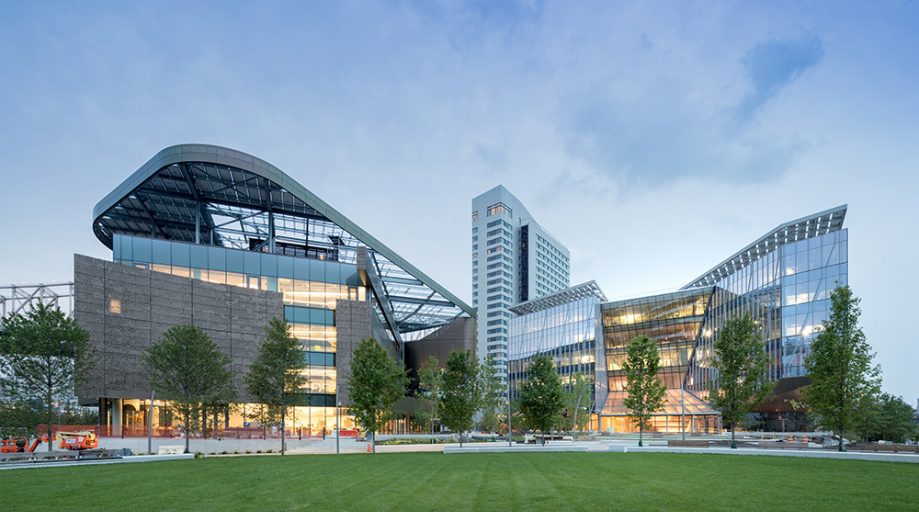Gear Up For These January MBA Deadlines

The next round of MBA admissions is swiftly approaching, with the eve of 2018 almost here. Time to mark those calendars!
New York City
The NYU Stern School of Business, Columbia Business School, and Rutgers Business School, Newark/New Brunswick are the big headliners when it comes to deadlines in the New York City metro in January.
The Forham University Gabelli School of Business, and the Syracuse University Whitman School of Management Online MBA program also have deadlines in the first weeks of the new year. Click here for more information on upcoming New York City metro deadlines.

The third round for application deadlines to Cornell’s Tech MBA on its new Roosevelt Island campus arrives January 10, 2018.
Los Angeles
The biggest Los Angeles metro business school institutions all have a slew of deadlines ready to pass within the first weeks of the new year, including the UCLA Anderson School of Management‘s full-time MBA, USC Marshall‘s part-time program, as well as the Claremont University Peter F. Drucker and Masatoshi Ito Graduate School of Management‘s part-time MBA.
Take a look at the coming deadlines in the Los Angeles metro here.
Toronto
Two Toronto metro schools have deadlines in early January, with the Ivey Business School full-time, Accelerated, and EMBA deadlines all falling on January 8, 2018. The second round deadline to the University of Toronto Rotman School of Management‘s full-time MBA also falls on January 8.
Take a look at the coming deadlines in the Toronto metro here.
Chicago
Two of the most prominent business schools in the entire Chicago metro—Chicago Booth and Northwestern Kellogg—feature a bevy of full-time, part-time, and Evening MBA deadlines before January 10. As well, the Quinlan School of Business at Loyola University’s full-time MBA for its annual spring intake arrives on January 15, 2018.
Just outside of the city, on the near border of Indiana, the Notre Dame Mendoza College of Business’ second round deadline for its full-time MBA program is set for January 9.
Get familiar with the coming deadlines in the Chicago metro here.

The second round of deadlines for the Northwestern Kellogg part-time and full-time MBA programs arrives on Jan. 10, 2018.
Boston
In Boston, the heart of America’s higher education, every January is a major month for several of the country’s most prominent MBA programs. Indeed, Harvard Business School and MIT Sloan, as well as the Questrom School of Business at Boston University, the Carroll School of Management at Boston College, and Northeastern University’s D’Amore-McKim School of Business all have MBA deadlines right at the beginning of the new year for various MBA programs.
Take a look at the coming deadlines in the Boston metro here.
For updated deadline information in Philadelphia, Washington DC, Baltimore, Atlanta, Dallas, Houston, Denver, San Francisco, San Diego, Seattle, and London, click here.
How Boston Business Schools Help Low-Income MBA Applicants

Anyone planning on earning a postgraduate business degree knows that MBA programs cost a lot of money. In the Boston metro, where the cost of living is already high, the annual cost of an MBA program can reach upward of $100,000 … Ouch! Continue reading…
Philadelphia or Boston? Where’s the Best Place to Earn a Part-Time MBA

If you are interested in pursuing a degree in a diverse East Coast city, want to be surrounded by history and culture, and still immerse yourself in growing business community, two main cities come to mind: Philadelphia and Boston.
Both cities are at the center of U.S. history, and continue to be some of its largest centers of commerce and academia, with numerous opportunities to put its stellar education to work.
Surrounded by so many possibilities for professional development, an MBA student in a city like Philadelphia or Boston may not want to put their career and income on hold to pursue a full-time degree.
Thankfully, many of the business schools in Philadelphia and Boston offer part-time MBA programs, allowing students more flexibility as they kick off their careers in these exciting cities. But how to decide which one? We’ll take a look at some of the top part-time MBA programs in each metro to help you choose the right city for you.
Location
Once the capital of the United States, Philadelphia has never stopped being a center of both business and history since the time it played host to the country’s founding fathers. Home to some of the oldest and best universities in the country, Philadelphia has experienced a renaissance in recent years as young talent has become priced out of more expensive metros like New York City and Washington DC. The cost of living in Philadelphia remains fairly low, while the ever-growing business scene in the city offers the opportunity for high earning potential. This year, 14 Philadelphia-area companies made the Fortune 500 list.
Like Philadelphia, Boston has been a center of commerce and trade since the days of the Boston Tea Party. Today, the city is home to nine Fortune 500 companies, including major established firms like GE (13th on the Fortune 500 list) and newer but thriving businesses like Wayfair. However, Boston has a much higher cost of living than Philadelphia. The city currently ranks as the third most expensive city in the country.
Programs
Between the Wharton School of Business and the Harvard Business School, Philadelphia and Boston offer two of the most highly regarded MBA programs in the country. However, both of these schools only offer full-time MBA programs. Students looking for more flexibility in their schedules still have a number of stellar programs to choose from.
Most of the part-time MBA programs in the Philadelphia metro work on a hybrid structure, allowing students to take a combination of classes both online and in person. Many programs also offer students the chance to select majors or concentrations in which to specialize their business education. With a variety of possible concentrations at some of the most highly-ranked part-time programs in the country, students from these programs have gone on to find employment at major firms like DuPont, KPMG, and JPMorgan Chase.
Part-Time MBA Programs in Philadelphia Include
- Lehigh University College of Business and Economics
- Fox School of Business – Temple University
- La Salle University
- LeBow College of Business – Drexel University
- Lerner College – University of Delaware
- Rohrer College of Business – Rowan University
- Rutgers School of Business, Camden
- Villanova School of Business
- West Chester University
Like Philadelphia, Boston’s part-time MBA programs offer more flexibility for students to complete their degree on their own time. Most courses are offered in the evening or on weekends, and can be taken over the course of just two years or up to seven. Programs like the MBA at D’Amore-McKim also give students the opportunity to concentrate in fields such as Corporate Finance, Corporate Renewal, Entrepreneurship, and more.
Part-Time MBA Programs in Boston Include
- Carroll School of Management – Boston College
- D’Amore-McKim School of Business – Northeastern University
- F.W. Olin Graduate School of Business – Babson College
- Questrom School of Business – Boston University
- Sawyer Business School – Suffolk University
- Simmons School of Management
Cost
The tuition costs can vary from program to program, and can also be cheaper if the part-time program is competed online. On average, programs in the Philadelphia metro area can range from $45,000-$65,000 for the degree. The range of costs in Boston can be slightly higher, with some students spending up to $95,000 over the course of their degree.
Jobs
Although the cost of an MBA in Boston may be slightly higher than Philadelphia, the difference in average salary between the two cities may even out concerns of cost. In Boston, the average salary for someone with an MBA degree in a field like finance is $112,000, whereas in Philadelphia it is only around $90,000 per year.
Boston’s Essential Nonprofit MBA Programs

Business doesn’t only have to be about flipping a dollar. Some work isn’t about how much money a business makes but, rather, how much change it makes. This is part of the drive behind nonprofits and why some people dream about leading one.
Nonprofits provide rewarding work, and they’re right down the alley for those who believe in social change and people who don’t want the influence of corporate money. The nonprofit sector is a surprisingly huge as well, employing more than 10.7 million employees in the U.S. alone. Luckily, many schools have recognized the need for a proper education in this field. After all, nonprofit business is a particular kind of model, and it requires a particular kind of knowledge.
So why not learn the ropes in Boston? It’s not far from Washington DC, either, for those interested in policy work. It’s also a short ride to New York City, where there are more than 35,000 nonprofits. The state of Massachusetts offers roughly the same number, to put it into perspective, but the Massachusetts Nonprofit Network offers the state a unique resource to help connect nonprofits with funders and elected officials.
If Boston is the right city for you, here are three schools that offer competitive nonprofit MBA programs.
Questrom School of Business – Boston University
This MBA goes by another name: Social Impact MBA. Boston University’s Questrom School of Business program is one of a kind. It’s formerly known as the Public & Nonprofit MBA, but this name suits it better. The program’s key skills are marketing, public policy, and financial management—the ingredients to a boss nonprofit.
The program shares the same curriculum as the school’s full-time MBA and then some. The required social impact course is titled Fundamentals of Nonprofit Management. Electives will help students better concentrate their skills on areas they want. If you want to work in Latin America, Questrom’s got a class for that. Sustainability strategy? Yup. And even a course that teaches the importance of a mission.
D’Amore-McKim School of Business – Northeastern University
Northeastern University‘s College of Professional Studies offers a Masters of Science in Nonprofit Management on the Boston campus. While separate from the D’Amore-McKim School of Business, this program certainly gives the same business appeal from the business school.
The program comes in two sizes: full-time and part-time. Most students complete it between one and a half to two years. The school states, “Integrating theoretical approaches with practical applications, the Master of Science in Nonprofit Management prepares you for a leadership position in a not-for-profit university, hospital, charity, foundation, or religious organization.”
READ MORE: Which Boston MBA Programs Offer the Best Return on Investment?
Northeastern students can walk away with skills like fundraising, legal literacy, grant writing, and more. There are seven concentrations to choose from: global studies, human services, leadership, organizational communication, project management, social media and online communication, and sport and social change.The program costs roughly $30,000, and 11 percent of students receive financial aid.
Sawyer Business School – Suffolk University
Suffolk University has many different MBA program offerings, including a healthcare MBA, an executive MBA, and, of course, a nonprofit MBA. This specialty degree will teach students how to successfully lead a nonprofit. Seated within the Sawyer Business School, which has been around since 1937, the program includes a number of interesting courses.
One featured course is on law and ethics, with another on public service communication, as well as a vital grant writing course. The program costs $1,424 per credit and can require anywhere from 45 to 58 credits. Students will be working out of downtown Boston with easy access to businesses conducting nonprofit work daily.
Boston University Consumer Study Finds Positives in Geo-Targeting

It’s been written that traditional direct mail coupons are a “lose-lose scenario” for two competing brands as they effectively negate the possibility that one company can profit over the other. Beyond the profit margin, coupons are out-of-time, out-of-place propositions that don’t take into account our busy, mutable schedules.
Which Boston MBA Programs Offer the Best Return on Investment?

A stellar résumé, well-targeted recommendation letters, and a strong GMAT score may be vital in earning a spot in your dream business school, but one factor that may weight heavier than everything else is the return on investment. Will the school be worth it? How successful are its alumni? How do employers feel about the school name on a diploma?
A person needs to know that their time—and money—will amount to success and a well-paying job. If Boston‘s the city for you, here are the top four business schools if return on investment, or ROI for short, is on your mind.
#1) Harvard Business School
This prestigious university might come as no surprise as first on our list. But it’s not at the top for nothing. Home of one of the world’s first MBA programs, Harvard Business School is a bit separate from the main campus itself in Cambridge, sitting in Boston’s Allston neighborhood.
Unsurprisingly, the program’s ROI is highly-competitive. Tuition at HBS currently costs around $72,000. That’s a lot more than how much a student might pay per year elsewhere, even without considering the usually stellar track record of HBS grads. Graduates in 2016 had median base salaries of $135,000 with a median signing bonus of $25,000. Sixty-eight percent received a signing bonus. That’s a lot of people. And it’s a pretty sure thing. Work hard at Harvard, and it appears you’re sure to reap the benefits.
READ MORE: HBS Announces Largest-Ever Scholarship Donation
#2) Sloan School of Management – MIT
At MIT’s Sloan School of Management, students can feel certain they’ll succeed after graduation. Individuals, of course, may determine their own success, but Sloan knows how to get its students there. The school is known for its business offerings, particularly its global Sloan Fellows program. There, students can walk away with an executive MBA in just one year. Sloan has been growing its educational base since 1914 when its “Engineering Administration” course set a business tone in the technical school.
Currently, tuition at MIT Sloan sits at $71,000, which isn’t much less than Harvard’s. The median base salary for 2016 graduates was $125,000, with salary ranging anywhere from $40,000 to $200,000.
The business school can provide a myriad of opportunities, especially through its various centers and initiatives, which focus on, science, innovation, medical research, and more.
#3) D’Amore-McKim School of Business – Northeastern University
This business school is tucked in Boston’s arts neighborhood, the Fenway Cultural District. Northeastern University offers multiple campuses, but the MBA programs take place at the D’Amore-McKim School of Business.
MBA students pay the same tuition for classes online or in person: $1,560 per credit hour. For a year, that’s roughly $28,080—significantly less than the aforementioned Harvard and MIT. So if you’re not ready or can’t afford to drop a bunch of money on costs, D’Amore-McKim might be the program for you. Its graduates go on to make $81,000 a year, which is nearly 66 percent more than yearly tuition. The top base salary for recent alumni is $115,000.
These employment opportunities come quickly: 96 percent of D’Amore-McKim alumni accept a job offer within three months of graduation.Companies like Zipcar and Hasbro, Inc., hired graduates last year. Resources like the Graduate Career Center and the school’s clubs can help students make it. Clubs like the Emerging Markets Club gives students the hands-on experience they need to succeed.
#4) Questrom School of Business – Boston University
The Questrom School of Business at Boston University offers a variety of MBA programs. The first was launched in 1925, but the school went on to add an executive MBA, public and nonprofit MBAs, evening MBAs, and health sector MBAs.
A full-time MBA tuition costs $51,916 at Boston University. The prices vary depending on which program a student decides is right for them, which contributes to the school’s placement on the list. For example, the executive MBA costs nearly double the traditional MBA rate. However, alumni do go on to make that money back. In 2016, graduates’ mean base salary was $100,820. About 92 percent of graduates accepted a job offer just three months after earning a degree, with nearly all taking an internship. Places like General Motors and IBM hired recently hired Questrom grads.
You could be next. But it’s up to you to decide what school makes the most sense for you. You’re onto something with Boston though. The seafood will never end, and the accents will always entertain. Find the city’s best executive MBA program or explore its one-year MBAs if you need just a little bit more info.
